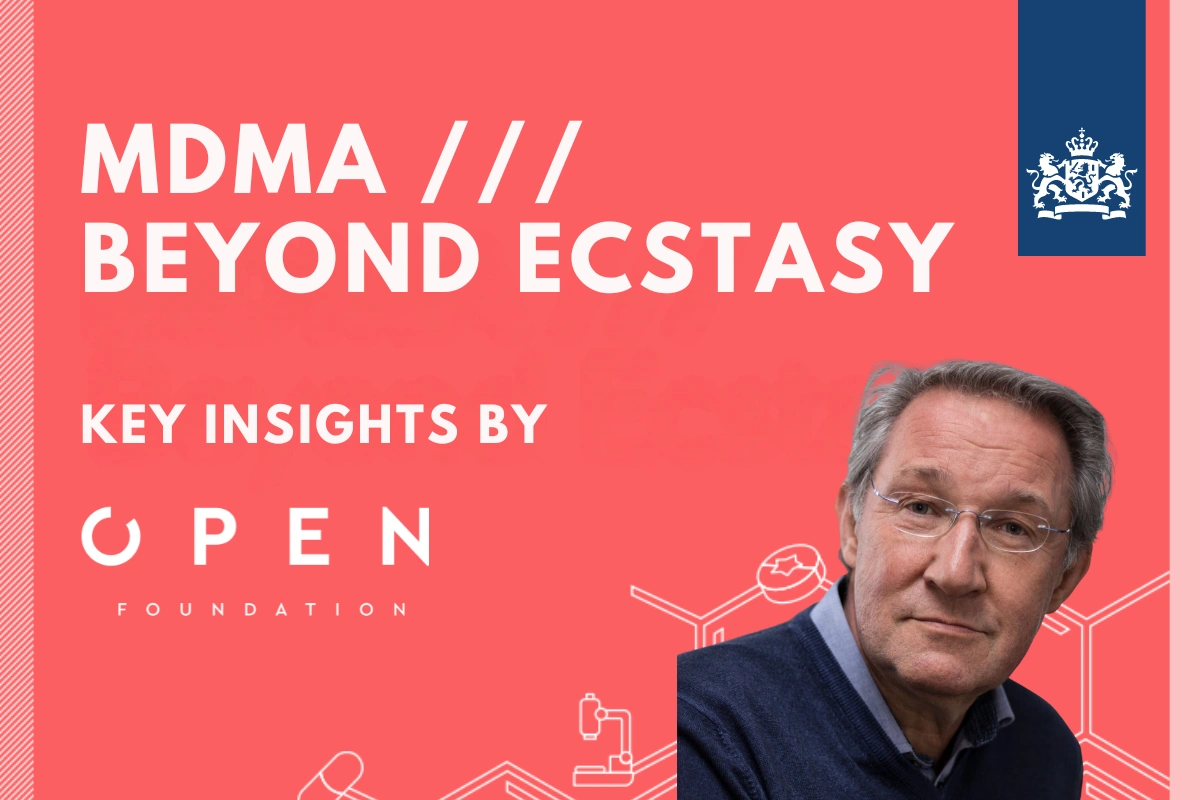In a landmark moment for drug policy, the Dutch State Commission on MDMA has released its highly anticipated report, “Beyond Ecstasy“. Spanning over 200 pages, this document explores the multifaceted dimensions of MDMA, including its recreational use, potential therapeutic benefits, and broader implications for public health and policy. We aim to provide you with the key highlights of this thorough examination aimed at guiding the Dutch government in its future decisions regarding MDMA.
Context of the Dutch State Commission on mdma
The formation of the State Commission on MDMA was a response to a coalition government promise to re-evaluate the drug’s status within the Dutch Opium Act. The commission, which included experts from various fields such as addiction psychiatry, criminology, emergency medicine, and drug prevention, worked from April 2023 to May 2024. This multidisciplinary approach ensured a holistic understanding of MDMA’s impact.
report presentation by wim van den brink, md, phd
Wim van den Brink, professor of Addiction Psychiatry at the Amsterdam University Medical Centers presented the report 2 days after its release at the ICPR conference in Haarlem, June 2024.
Discover more talks from ICPR 2024 talks, symposia, lectures & Q&A!
the Potential of MDMA assisted therapy
A central aspect of the report is its exploration of MDMA’s potential therapeutic benefits, particularly in the treatment of PTSD. The commission reviewed existing research and concluded that MDMA-assisted therapy shows promise for patients with treatment-resistant PTSD.
efficacy and Safety in Treating PTSD
The report discussed current research and clinical trials, highlighting the effectiveness of MDMA-assisted therapy in treating PTSD. To ensure safety and efficacy of MDMA-assisted therapy, the report highlights the importance of context.
“MDMA-assisted therapy has shown significant promise in the treatment of PTSD, particularly for patients who have not responded to traditional therapies. This could represent a major advancement in psychiatric treatment” — MDMA /// Beyond Ecstasy Report
“The therapeutic use of MDMA must be conducted under strict medical supervision to ensure safety and efficacy.” — MDMA /// Beyond Ecstasy Report
Need for Further Research: state commission Proposing a Naturalistic Study in the Netherlands
“Further research is needed to explore the long-term effects and potential applications of MDMA in various psychiatric and neurological conditions.” — MDMA /// Beyond Ecstasy Report
To facilitate the use of MDMA in therapy to treat PTSD, the commission proposes a large naturalistic study in the Netherlands. This study would help gather more data and refine treatment protocols. Wim van den Brink highlighted, “A large naturalistic study will provide the necessary data to support the safe and effective use of MDMA in clinical settings”
education and training to meet the need
“Investing in training programs and specialized centers is essential for the successful implementation of MDMA-assisted therapy.” — MDMA /// Beyond Ecstasy Report
Establishing specialized centers and training therapists are critical steps for implementing MDMA-assisted therapy. While some qualified therapists are already available, more are needed to meet the potential demand.
Prevalence and Risks of Recreational MDMA Use
“The prevalence of MDMA use in the Netherlands is among the highest in the world, yet the number of MDMA-related deaths remains relatively low, highlighting a unique consumption pattern and harm reduction practices in place” — MDMA /// Beyond Ecstasy Report
The second central theme of the report is the prevalence and associated risks of recreational MDMA use in the Netherlands. Despite the high prevalence, the report highlights that the frequency of use and the number of pills consumed per session are relatively low compared to other countries. This pattern may contribute to the lower number of MDMA-related deaths observed in the Netherlands.
The Dutch approach to drug policy heavily emphasizes harm reduction, which is reflected in the safety measures implemented at events where MDMA use is common. As noted in Wim van den Brink’s presentation at ICPR 2024, who emphasized the importance of “set and setting” in minimizing harm during MDMA use, factors such as the availability of care facilities, water, and first aid services at events significantly reduce the risks associated with MDMA use.
The report calls for improved postmortem evaluations to better understand the exact causes of MDMA-related risks. Currently, the lack of comprehensive postmortem studies makes it difficult to determine the precise role of MDMA in fatalities, especially when other substances or external factors might be involved.
Public Health and Drug Policy
The report emphasizes a public health-focused approach to drug policy, advocating harm reduction overcriminalization. It criticizes the current lack of a cohesive national drug policy and calls for an integrated prevention program. The importance of targeted drug education and continuous monitoring of drug trends is also highlighted.
“The Dutch drug policy should remain primarily aimed at public health, avoiding the criminalization of users. Prevention strategies must be evidence-based, focusing on harm reduction rather than punitive measures.” — MDMA /// Beyond Ecstasy Report
to conclude
The Dutch State Commission on MDMA’s report “Beyond Ecstasy” is a pivotal document that could shape the future of drug policy and medical treatment in the Netherlands. By addressing the risks and potential benefits of MDMA and MDMA-assisted therapy, the report aims to provide a framework for policymakers.
As the Dutch government considers these recommendations, patients in need, therapists, researchers and the general public will be paying attention. At OPEN Foundation, we are hopeful that this may be a step toward responsible, safe, and beneficial integration of psychedelics into society and healthcare.














